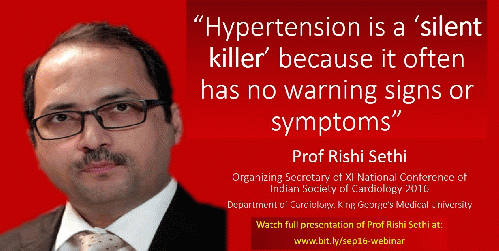
Preventing cardio-vascular diseases is a public health imperative: Prof Rishi Sethi of KGMU
(Image by CNS (Citizen News Service)) Details DMCA
This is the message of the World Heart Federation for this year's World Heart Day, which is observed on September 29 every year to raise awareness about cardiovascular diseases (CVDs), which include heart disease and stroke. The CVDs, along with cancer, diabetes and chronic lung disease, form the 4 major non-communicable diseases (NCDs) and together account for 82% of the 38 million deaths caused by NCDs every year.
Over 17.5 million deaths due to CVDs every year!
CVDs are responsible for most NCD deaths, killing 17.5 million people (7.4 million from heart attacks and 6.7 million from strokes) every year, followed by cancers (8.2 million), respiratory diseases (4 million), and diabetes (1.5 million). Yet at least 80% of premature deaths from CVDs can be avoided by controlling tobacco consumption, unhealthy diet, physical inactivity and harmful use of alcohol.
Hypertension is the biggest risk factor for CVD, followed by tobacco use, diabetes, physical inactivity and obesity. 13% of global CVD deaths are attributed to raised blood pressure, 9% to tobacco use, 6% each to diabetes, and physical inactivity, and 5% to obesity.
In an exclusive media webinar (www.bit.ly/sep16-webinar), organised by CNS (Citizen News Service) and the International Union Against Tuberculosis and Lung Disease (The Union), Professor (Dr) Rishi Sethi from the Department of Cardiology at King George's Medical University (KGMU), shared the findings of the biggest nationwide blood pressure (BP) survey organised by The Cardiology Society of India on 21st September 2015, in which the BPs of around 0.15 million respondents were measured simultaneously, at 700 sites in 100 Indian cities spanning 24 states, over an 8 hours period.
The initial findings (based on a sample of 74,520) are startling indeed. 33% of the respondents were found to be hypertensive, out of whom 25% were between 31-45 years and 13% between 18-30 years. So it is no longer an old age disease. Also 62% of people with hypertension (HTN) were unaware of their condition, which points to a lack of awareness and good screening tests. Despite medications, 42% of hypertensive people had uncontrolled blood pressure, putting them at high risk for heart disease. Thus the findings reveal that 1/3 of Indians above 18 years have hypertension; 2/3 of those with high BP are not aware of their disease; and in nearly 1/2 of the known cases, HTN is not well controlled.
Dr Sethi called for aggressive cardio-preventive measures, saying that an optimal blood pressure of less then 120/80 mm Hg and HbA1C more than 7% of blood glucose level should be maintained through lifestyle approaches.
Other emerging risk factors are obesity, unhealthy diet, physical inactivity and stress/depression. Dr Sethi advised that, "The median BMI for adult populations should be in the range of 21-23 kg/m2. Elimination of trans-fat and replacement of saturated with polyunsaturated vegetable oils, along with moderate exercise for 30 minutes 5 days a week, will lower coronary heart disease risk. Stress and depression should be avoided as they almost double the risk of coronary artery disease in previously healthy adults".
(Note: You can view every article as one long page if you sign up as an Advocate Member, or higher).





